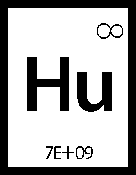The Human Element
The Human Element (more correctly known by its Latin name homoerectium; symbol Hu, atomic number ∞) is an extremely widespread chemical substance with a mysteriously elusive nature. It is unique in being the only chemical element which does not seem to have a specific number of protons, as well as the only one whose distribution is closely regulated by the IUPAC and FCC.
Chemical nature[edit]
The exact nature of homoerectium is a controversial topic of debate among scientists, as every attempt to study it seems to yield entirely different results. While a large number believe it to be a highly stable element in its "pure" form, there are those who believe it to be more unstable and possibly even prone to radioactive decay and nuclear meltdown. Although a primitive form has purportedly been located in the wild, it is more often unexpectedly discovered in a laboratory setting, or even in the most seemingly mundane of human developments.
Research has led to a third hypothesis being proposed, which has lately gained significant ground among certain physicists. The theory states that while the "pure" form of the element is indeed a primarily stable one, the exact nature depends on a wide array of factors, including the number of protons, neutrons, and electrons in the atom; the number of said protons, neutrons, and electrons in neighboring atoms; the temperature of the surrounding environment; interference from outside sources; and how long it has been since someone bought the scientist in question a beer.
Further studies have shown that homoerectium is found in almost all human brains, and seems to be present in particularly large amounts whenever two or more people get together or meet one another in some other way. Whether it has a positive or a negative effect on those it affects is hard to say, as even the scientists conducting the studies have been shown to have (however faint) traces of the element in their own bodies. It is also commonly found in certain widely-used electronic communications devices, where its exact function is currently being investigated by specialized laboratory known as CISCO.
History[edit]
Homoerectium was first discovered by accident while researching other topics. While the discovery of marketingbullshittium (as it was then known) has been attributed to many researchers, including Dr. Đùşśąŀəĥøæß, Stephen Hawking, Oscar Wilde, Oprah, the Pope, and Pikachu, no one person can accurately be claimed to have first noticed what would later be known as "the human element". Since history is boring anyway nobody really bothered writing anything down about the discovery, although this may also have been due to a lack of funding to continue research into the subject.
Regulation[edit]
Homoerectium is often closely controlled to prevent abuse. Current regulation is overseen by a total of four distinct organizations, who must unanimously agree to any changes regarding its distribution and use.
The current organizations responsible for control of homoerectium as of 2007 are:
- The Department of Whatchamacallit (DOW), which is the largest international body studying the element and is responsible for producing public service announcements and controlling trade of samples between itself and other organizations.
- The Corporation Internationale du Stupid Commercial Oh-merde-I-forgot-what-the-last-letter-is (CISCO), which was recently founded after a major breakthrough to study applications of the "human element" in social and electronic networking.
- The International Union of Pure and Applied Chemistry, which pretty much does absolutely nothing except sit around trying to (a) calculate its atomic number of infinity and (b) figure out how they can squeeze it small enough to fit on their periodic table.
- The Federal Communications Commission (FCC), which oversees its responsible distribution through electronic mass media, as a result of its unique ability to spread itself – often in a potentially dangerous mutant form. Its position has not been entirely uncontroversial, as no other chemical element has previously been subject to the Communications Decency Act before.
Applications[edit]
While no attempts at artificial applications of homoerectium have been successful, it has been noted to spontaneously form and react with varied results within everyday human interactions. However, an interesting side affect has arisen from CISCO's and DOW's frequent public service announcements, particularly those on certain specialized networks: There mere mention of "the human element" seems to have a very pronounced – and indeed, strangely consistent – effect in itself, often leading to unexpectedly increased sales in chemicals, construction materials, cell phones and computer networking equipment. No explanation is currently available for this unusual phenomenon.
